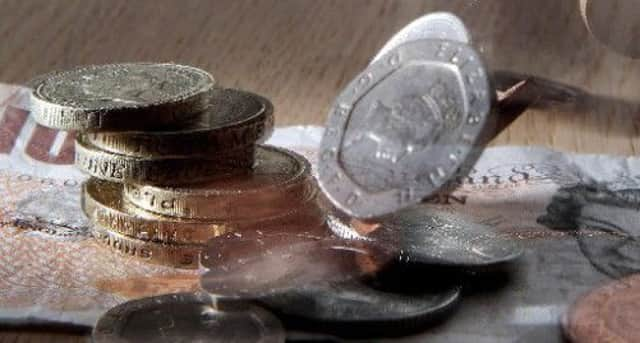Council chiefs’ pay an area for transparency


I’m not aware of any officials retiring on their handsome pension or being made redundant with a generous pay-off, both courtesy of the council tax payer, but last week TaxpayerScotland, a campaign group fighting for value for money for taxpayers, published a list of those on our councils’ payrolls receiving more than £100,000 and it caught my eye.
Now before I start and possibly upset some, possibly the majority, of my readers, let me give a little context to what I am about to summarise.
Advertisement
Hide AdAdvertisement
Hide AdCouncillors in Scotland receive a basic salary of nearly £17,000 which may be topped up with responsibility allowances and by the earnings of their fulltime jobs – while MSPs enjoy a salary of £57,520 and MPs £65,738. By comparison the British Prime Minister, David Cameron, is awarded a total income of £142,500 while Scotland’s First Minister Alex Salmond is close behind, receiving £140,847 – but surprisingly beating both of them is the Mayor of London, Boris Johnson, who receives £145,350 (Greater London has more residents than Scotland but the Mayor has significantly fewer responsibilities). The permanent secretary to the First Minister, essentially the top civil servant in Scotland, receives just over £175,000 per annum.
So, taking those figures into account, what would you expect the top officials in a council to earn? Maybe £90,000, or £100,000, or even £120,000? TaxpayerScotland found that for the 32 councils in Scotland in 2011-12, some 236 officials were paid more than £100,000 – which, happily, was down from 249 in 2010-11. That does not tell the whole story, however, for within that 236 there were 58 who received over £150,000 per annum – more than Cameron, Salmond or Johnson – and there were 12 who earned more than £250,000!
Just as I believe elected politicians should be paid well enough to attract the best calibre of people, so too would I accept that officials also have to be paid what may be deemed to be the going market rate and that this is likely to be higher than what politicians will be willing to accept.
We need to be cogniscent that recruitment for officials happens within the British marketplace and while public sector salaries are often lower than equivalent private sector roles they are often less risky and receive better pensions.
The question, then, is really about value for money, especially in these times of public sector austerity when the pay of many workers has been frozen or kept to very slight increases. Eben Wilson, director of TaxpayerScotland, says: “The figures show that councils are not taking any radical reduction in senior staff pay. There were a series of redundancies through last year that cost a lot of money, but it also looks as if annual increments are taking some more people into the six figure bracket.” The increase in those earning over £150,000 suggests Wilson is right.
Not surprisingly, Glasgow and Edinburgh dominate the tables with, respectively, 27 and 21 officials earning above £100K, while Fife, Highland, South Lanarkshire and Dundee are all into double figures.
What then do the officials do to earn more than our most senior politicians who may take the glory but can overnight become hate figures, be out on their ear at an election and the subject of public ridicule – while most officials are anonymous except with their staff?
Including employer pension contributions, Edinburgh’s director of children and families, responsible for education amongst other things, earned £170,640 – the highest of all education officials – which is interesting considering nearly a quarter of Edinburgh schoolchildren receive independent education outwith the council.
Advertisement
Hide AdAdvertisement
Hide AdThis is trumped by Glasgow’s assistant director of development whose salary before employer pension contribution was £177,633 – with his boss the director of development receiving £223,469. Not to be outdone, the chief executives in Glasgow and Edinburgh received £211,731 and £158,553 before pension contributions.
To earn large salaries, officials do not have to work for the largest councils with the biggest populations: in West Lothian the chief executive received £140,227 while in Shetland the CEO received £155,739 – both before pension contribution.
Now, it may well be that these salaries are justified, in the sense of councils seeking to recruit the best available talent, the performance of the individual holding the posts and the responsibilities that they hold – the problem is that it is hard to know.
The extent to which the public has any say in the remuneration is severely limited, as is the accountability to the public for the performance. It is essentially all in the hands of our councillors – who may not be the most dispassionate of individuals, working, as they do, with the officials on a daily basis.
“Is anyone looking at what local councils should be doing and what they should not be doing?” asks Wilson. “They have a strategy for everything and then some. Taxpayers do not want aggrandising councils, they want their bins emptied, their streets cleaned and some specific localised services provided, but not as duplicates of national services.”
In my capacity, at the time, as convener of the Scottish Parliament’s audit committee, I once visited the auditors of New York City and found that every year they published the accounts and then had public hearings where ordinary individuals could come and ask questions about every nickel and dime payment. It kept the officials on their toes and ensured the public had a say.
I have no quibble with paying officials well for doing a good job, but maybe we should be considering how we test their efficiency and let the public have a say. Is it right that the public has to rely on TaxpayerScotland to know the scale of our officials’ rewards?